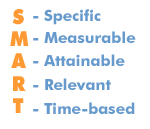Define Your Goals
When taking on any challenge, it’s a good idea to define your goals. You should identify what you want to accomplish and how you will carry out your plan. This is important when making positive change and will help you succeed.
Before starting this program, set short-term and long-term goals. These goals should be
S-M-A-R-T:
For example:
A specific short-term goal may be to start strength training; the long-term goal may be easing the symptoms of arthritis, improving balance, or controlling your weight. This goal is easily measurable: Have you or have you not begun the program? Indeed, this is an attainable goal, as long as your doctor approves, and this goal is certainly relevant to living a long, healthy life. Your goal should be time-based: you should read this book within 5 days, buy the equipment you need, and set your exercise schedule within the next 5 days. Start the program within the following 2 to 3 days.
The goals and time frame are entirely up to you. You may want to focus your long-term goals on improving a specific health condition, such as reducing pain from arthritis, controlling diabetes, increasing bone density to help combat osteoporosis, or increasing muscle mass to help with balance or weight control. Or your goal may be to bowl or play tennis, or perhaps to do all of your own chores, such as cleaning windows or vacuuming. Your success depends on setting goals that are truly important to you—and possessing a strong desire to achieve them.
Goal-Setting Worksheet #1
Identifying Your Short-Term Goals
Identify at least two of three of your own short-term goals and write them on the personal goal- setting worksheet provided. If you have more goals, write them down as well. Remember that each goal should be S-M-A-R-T—specific, measurable, attainable, relevant, and time-based. Setting these short-term goals will help motivate you to make the program a regular part of your life.
 Examples:
Examples:
- I will talk to my doctor about starting this program.
- I will buy the equipment I need and get ready to exercise within 2 weeks.
- I will look at my calendar and schedule 2 or 3 45-minute blocks of time for exercise each week.
- I will invite my spouse/friend/family member to join me in these exercises.
Goal-Setting Worksheet #2
Identifying Your Long-Term Goals
Identify at least two or three long-term goals and write them on the personal goal-setting worksheet provided. If you have more goals, write them down as well. Are there activities that you want to do more easily over the long term? Are there things that you haven’t done in some time that you want to try again? Listing these goals will help you stay with the program, see your progress, and enjoy your success. (Don’t forget to use the S-M-A-R-T technique.)
Examples:
- I will do each exercise 2 or 3 times each week. Within 3 months, I will do each exercise with 5 lb. weights.
- After 12 weeks of the program, I will take the stairs instead of the elevator.
- I will be able to walk to the store or office.
- I will do my own vacuuming.
- I will play golf.
- I will reduce some of the pain and stiffness from arthritis.
Download your own personal goal-setting worksheets (PDF-54K)
![]() Please note: Some of these publications are available for download only as *.pdf files. These files require Adobe Acrobat Reader in order to be viewed. Please review the information on downloading and using Acrobat Reader software.
Please note: Some of these publications are available for download only as *.pdf files. These files require Adobe Acrobat Reader in order to be viewed. Please review the information on downloading and using Acrobat Reader software.
- Page last reviewed: December 3, 2008
- Page last updated: December 3, 2008
- Content source: Division of Nutrition, Physical Activity and Obesity, National Center for Chronic Disease Prevention and Health Promotion
Contact Us:
-
Division of Nutrition, Physical Activity and Obesity
4770 Buford Highway, NE, MS/K-24
Atlanta GA 30341-3717 - 800-CDC-INFO
(800-232-4636)
TTY: (888) 232-6348
24 Hours/Every Day - cdcinfo@cdc.gov



